|
|
|
Sort Order |
|
|
|
Items / Page
|
|
|
|
|
|
|
| Srl | Item |
| 1 |
ID:
106016
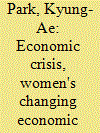

|
|
|
|
|
| Publication |
2011.
|
| Summary/Abstract |
Although many studies have analyzed the gendered impact of economic crisis, few have examined the case of North Korea. This article will explore how North Korea's economic crisis caused changes in women's economic participation. It will also analyze the impact of these new economic roles on the lives of women, and examine the broader implications of these roles for the status of women in North Korea. The North Korean economic crisis changed the pattern of women's economic participation, pulling women out of the formal labor market and driving them into the informal private economic sector. It also forced a number of women to leave their homeland in order to provide support for their own and their families' livelihoods. The new economic roles women have assumed in the wake of the food crisis have affected women's lives in many negative ways, resulting in an increase in their workloads, as well as an increase in the amount of sexual violence and stress of family breakdowns they experience. At the same time, however, these new roles have given women stronger voices in family decision-making matters and allowed them to develop, to some degree, a sense of self-consciousness and awareness of their own rights. Nevertheless, the fact that women have been engaged in new economic activities does not imply that they also have a high likelihood of advancing their socioeconomic status. To the contrary, women's defection from their homeland does not allow them to voice their opinions in matters related to the existing gender inequalities. Moreover, North Korean women are not considered capable of forming a critical mass, as they lack economic, social, political, and organizational resources to collectively voice their discontent. Furthermore, the neo-Confucian tradition of male superiority that is still firmly entrenched in the society is a major barrier that remains to be overcome.
|
|
|
|
|
|
|
|
|
|
|
|
|
|
|
|
| 2 |
ID:
128474
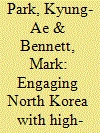

|
|
|
|
|
| Publication |
2014.
|
| Summary/Abstract |
As articulated by Joseph Nye, soft power is the ability to achieve goals through attraction rather than by threat or conflict. Although frequently associated with the state and foreign policy, non-state actors can also develop and possess soft power independent of the state. In particular, educational institutions have long held significant amounts of soft power that transcend national boundaries. Through knowledge sharing, educational institutions can leverage soft power to influence a society through educating its social and political elites, and future leaders.
Knowledge sharing that focuses on human resource development is one of the most successful areas of cooperation between North Korea and the international community. Knowledge sharing activities not only give North Korean participants access to knowledge but this access contains an important potential for socialization effects - the spreading of ideas, customs and values. Despite this, however, the current body of literature on knowledge sharing is quite limited.
Based on the on-going knowledge sharing experiences with North Korea at the University of British Columbia, this paper explores the nature and the development of knowledge sharing with Pyongyang, demonstrating that North Korea can be a 'willing interpreter and receiver' of soft power. Using the concept of university soft power, the paper proposes that educational institutions are inherently effective in using their influence and expertise to initiate successful, long-term knowledge sharing with North Korea. It will also examine strategies for successful knowledge sharing with Pyongyang and the impacts of such knowledge sharing with relation to engagement efforts with North Korea.
|
|
|
|
|
|
|
|
|
|
|
|
|
|
|
|
| 3 |
ID:
054020
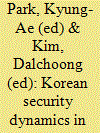

|
|
|
|
|
| Publication |
New York, Palgrave, 2001.
|
| Description |
xiv, 209p.
|
| Standard Number |
0312238746
|
|
|
|
|
|
|
|
|
|
|
|
Copies: C:1/I:0,R:0,Q:0
Circulation
| Accession# | Call# | Current Location | Status | Policy | Location |
| 045122 | 355.0330519/PAR 045122 | Main | On Shelf | General | |
|
|
|
|
| 4 |
ID:
050880
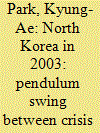

|
|
|
|
|
| Publication |
Jan-Feb 2004.
|
|
|
|
|
|
|
|
|
|
|
|
|
|
|
|
| 5 |
ID:
061106
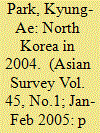

|
|
|
|
|
| Publication |
Jan-Feb 2005.
|
|
|
|
|
|
|
|
|
|
|
|
|
|
|
|
| 6 |
ID:
096028
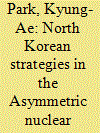

|
|
|
| 7 |
ID:
090092
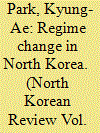

|
|
|
|
|
| Publication |
2009.
|
| Summary/Abstract |
The structuralist perspective of regime change looks at economic constraints as the principal explanatory variable of regime collapse, suggesting that both economic crisis and economic reform give rise to political pluralism, activate civil society, and thus lead to regime change. The Kim Jong Il regime in North Korea escaped its collapse in spite of the prolonged economic crisis. The article offers an analysis of North Korean exceptionalism in regard to the economic crisis and economic development theories of regime change. It argues that several components of political opportunity structures salient to North Korea work as constraints of regime change, and offers an assessment of prospects for activation of North Korea's civil society. An earlier version of this article was published as "Regime Change in North Korea?," in T. Roehrig, J. Seo, and U. Heo, eds., Korean Security in a Changing East Asia (New York, NY: Praeger, 2007), pp 70-92.
|
|
|
|
|
|
|
|
|
|
|
|
|
|
|
|
|
|
|
|
|